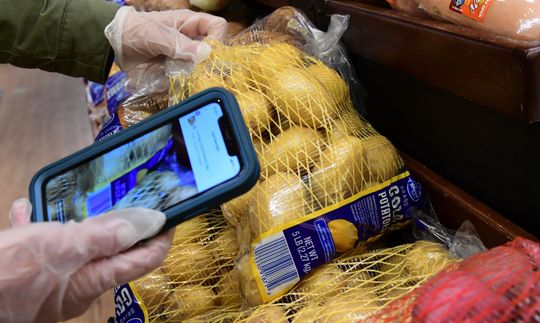CFO won’t say when the wait for an IPO or direct listing will end as new executive team looks to expand its offerings to grocers, including software and warehouses for ultrafast delivery
As Wall Street waits for Instacart to go public, the company’s new executive team is looking to build on the delivery-app company’s own side hustle: software and other services for grocery stores.
Instacart announced Wednesday that it’s doubling down on a lesser-known part of its operations, which is providing tech solutions to grocery chains like Publix and Aldi. Now, the company is expanding its software offerings to grocers that want to compete with the likes of Amazon.com Inc. AMZN, -0.90%, and opening its own warehouses in partnership with grocers to compete with younger delivery startups that are promising ultrafast delivery, such as Gopuff and Gorillas.
Instacart’s chief financial officer, Nick Giovanni, told MarketWatch in a Wednesday interview that the COVID-19 pandemic helped double the online-grocery market from 5% penetration five years ago, and that the industry expects 20% to 30% penetration in the next decade or so. Because of that, he said retailers will need more sophisticated tech tools, and Instacart hopes to provide them.
“That’s what it’s about, planning for the next decade of growth again,” Giovanni said. “The last 10 years was about getting online. The next 10 years is about helping digital transformation.”
The shift in consumer habits during the pandemic led to huge growth in demand for online delivery, helping DoorDash Inc. DASH, +2.78% complete a long-awaited initial public offering. It also helped Uber Technologies Inc. UBER, -0.87% offset a steep decline in ride-hailing with a surge in delivery revenue. Instacart had been expected to go public with the benefit of pandemic growth trends, especially after the hiring of Giovanni early last year.
Giovanni, a Goldman Sachs veteran, joined Instacart as CFO months before the company also changed its chief executive, hiring former Facebook Inc. FB, -1.47% executive Fidji Simo. In the announcement of Giovanni’s hiring, the company highlighted his extensive experience in advising companies as they go public, including the initial public offerings of Airbnb Inc. ABNB, -1.37%, DoorDash Inc. DASH, +2.78%, Twitter Inc. TWTR, -1.12%, Dropbox Inc. DBX, -0.60% and eBay Inc. EBAY, -0.27%, as well as the direct listings of Slack Technologies Inc. (which has since been bought by Salesforce.com Inc. CRM, -3.25% ) and Spotify Technology SA SPOT, +0.75%.
Yet when asked Wednesday about the timeline for the company’s Wall Street arrival, Giovanni declined to comment. And when asked for information on the company’s growth during the pandemic, Giovanni would not say any more about Instacart’s consumer business beyond a company statement that orders grew 30% year over year in 2021, and Instacart maintained the new customer base it gained during the pandemic.
What Giovanni did want to talk about is the company’s goal to become grocers’ go-to platform provider, by expanding offerings for e-commerce, fulfillment, advertising, in-store and data solutions for grocers. That would include deals like a partnership the company has struck with Publix to provide ultrafast deliveries from fulfillment centers that Instacart is calling Carrot Warehouses.
The test, which will involve Instacart-owned warehouses and Publix’s inventory, will launch in Atlanta and Miami in the next few months, and will aim for deliveries in 15 minutes or less. Giovanni would not share how many warehouses the company is envisioning to open, but he did say it would depend on partnerships with retailers.
He called the warehouses a complement to groceries, and said it’s just one part of the company’s broader goal of connecting retailers to consumers.
“This will help retailers go head-to-head with Gopuff and Gorillas,” Giovanni said.
Instacart was founded in 2012 and has raised $2.9 billion in 20 rounds of venture capital, according to Crunchbase. The most recent funding round valued the San Francisco-based company at $39 billion last year, but some large investors have since marked down their stake in the company, suggesting a valuation of less than $32 billion.

